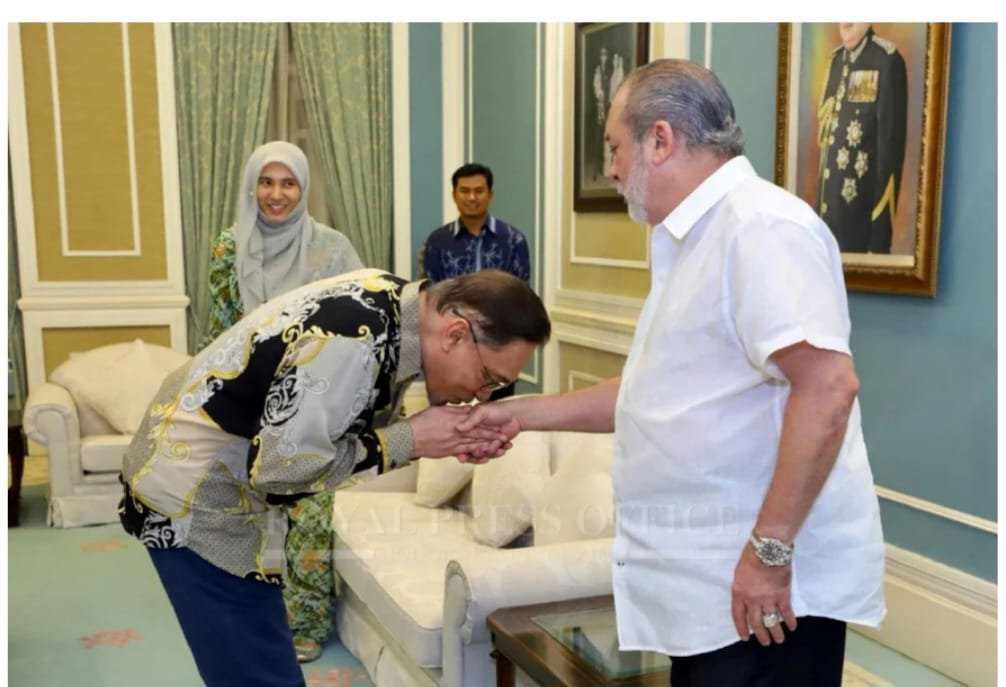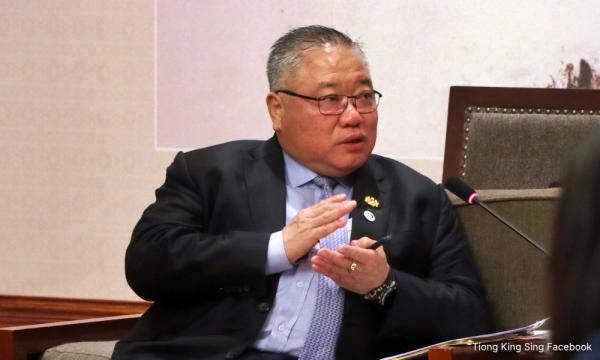
Murray Hunter
Why A Prime Minister With A Parliamentary Super-Majority Is So Weak
The Damage From The Najib Addendum Saga
Jan 08, 2025

Politics 101 teaches us that when a government has a super-majority in parliament, it will most likely be a powerful one, being able to push through its policy programs with ease.
However, the case in Malaysia is very different. Anwar Ibrahim claims to have a two-thirds majority in the Dewan Rakyat or lower house, and can even pass constitutional changes if necessary. However, Anwar as prime minister today looks weak, where cabinet ministers feel the need to make statements that Anwar should run his full term, in an attempt to prop him up.
Anwar became prime minister through the events that unfolded after the last general election in November 2022. Rather than obtaining a majority of seats that could enable the formation of a government in his own right, Anwar had to cobble together a coalition based upon promises and commitments made to other political party leaders, primarily UMNO, and GPS from Sarawak. The former Yang Di-Pertuan Agong, or King clearly favoured Anwar, rejecting the Perikatan Nasional claim to have a majority of supporting members elect.
This is why the proclaimed ‘unity government’ was also called the ‘Kerajaan Di-Raja” or Royal-government for a period of time. Clearly, Anwar didn’t have any peoples’ mandate to govern. Supporters of Anwar, during the early times of his administration often said ‘Anwar shouldn’t be criticised, because he was appointed by the king’.
This coalition was very much reflected in his government. Ahmad Zahid Hamidi, president of UMNO was appointed deputy prime minister, and a second deputy PM position was created to reward the Borneo states, particularly GPS with the appointment of Fadillah Yusof.
A number of other ministers were appointed because of favours, relationship, and loyalty and gratitude. Zaliha Mustafa, minister for federal territories was a former political secretary of Anwar’s wife Wan Azizah Ismail. Fadhlina Sidek, is the daughter of an associate of Anwar in ABIM, the Muslim youth movement. This is not meritocracy, but more towards a sense of nepotism.
Some cabinet members actually lost their lower house seats during the last general election and had to be appointed senators to serve. Saifuddin Nasution Ismail is home minister, Tengku Zafrul Tengku Abdul Aziz is minister of investment, trade, and industry, and Zambry Abdul Kadir, as foreign minister and later minister of higher education.
“Continued agitation over the issue of leadership change at this time could destabilise the economy and foreign investment” said cabinet minister Tiong King Sing. Its not the opposition or the people destabilising the government, its from within member party components unhappy with the way the government has handled the Najib issue. As it turns out, all the speculation over leadership has been internally generated by senior members of the cabinet withholding confirmation of the Najib Razak pardon addendum, purportedly granting house arrest.

Cabinet minister Tiong King Sing
The government has allowed the situation to arise where a convicted felon in prison has so much influence over the government.
Najib is highlighting the weakness of Anwar, while he is in jail. The Najib issue is eating away at the credibility of the ‘unity government’. UMNO looks like a party in complete disarray. There are now two major camps, those who support Zahid, and those who support Najib. There are also a number of splinter groups who are somewhere in between. This makes up the party that was the ‘kingmaker’ of Anwar’s coalition.
Anwar as prime minister appears to have been involved in a cover up of an addendum granting Najib home detention. Looks like he has conspired to keep him in Kajang Prison. There are questions Anwar is not answering. Anwar’s home minister Saifuddin is the front man to the media on this issue now. Saifuddin is set to take any fall if necessary.
Campaigned for Najib’s investigation, arrest, and imprisonment over the 1MDB financial scandal during the 2018 general election. Pakatan Harapan integrity is suffering, particularly with the infighting within UMNO, even though there is no involvement. This just adds to the tarnishing of integrity of Pakatan Harapan for joining together with UMNO in the formation of the ‘unity government’ in the first place. UMNO was portrayed as a hobbit of crime, dubbing the leaders as the ‘court cluster’.
Many of Anwar’s policies and directives have gone straight against the spirit of reform, known as ‘reformasi’, and strengthened institutions such as affirmative action for Malays, the continuation of the Sedition Act, failure to reform the defamation laws, scrapping petrol subsidies, raising electricity tariff, introducing new taxes on the middleclass, and curbing of freedom of speech have left the majority of PKR and DAP’s membership in a quandary. Many are searching for alternatives, but there is a leadership vacuum present within the Malaysian political arena.
Sarawak’s GPS just couldn’t care less and is using the current situation to turn Sarawak into a ‘nation within a nation’.
The Royal households have found themselves with more authority and much less public scrutiny due to the government imposition of the 3Rs (race, religion, and royalty), where it is taboo for the public to take issue with any of these subjects. The Royal households are taking advantage of the situation and expanding their business interests and demanding of the government for opportunities.
Anwar, as a prime minister has too many promises on his ledger to fulfil. This is threatening the independence he could have had with his nominal super-majority in the house. Anwar is inept to the demands of the monarchy and cronies within the network of the Malay elite. Anwar is also burdened by his longtime allegiance to the Islamic agenda, in stark contrast to the secularism Pakatan Harapan promised.
Anwar is entrapped by Malay Machiavelli politics, and has succumbed to the backroom arrangements he made to get the job. He is a compromised prime minister. Power rather than ideology and policy was always the objective, just as was seen with the Muhyiddin Yassin and Ismail Sabri Yaakob administrations.
Strong government cannot be expected anytime in the future of Malaysian government and politics, with existing First-Past-The-Post voting system and a divided Malay constituency. Its not the people who select the government, its backroom negotiation, signed off by the monarch.
Malaysian politics is best seen through ‘warlord and chieftain’ politics. The Najib pardon saga is a product of this system.
No comments:
Post a Comment